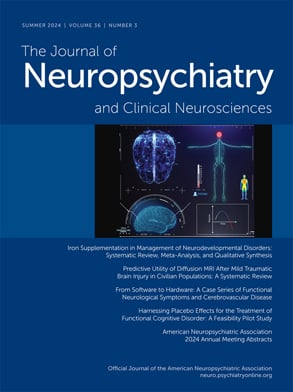SIR: It is well known that methamphetamine abuse can cause a psychosis in long-term users. Most patients, however, respond well to neuroleptics, and psychiatric admissions to acute care facilities are generally short. Still, it is not uncommon for methamphetamine patients to be resistive to treatment, showing continued psychotic symptoms despite extended periods of abstinence.
1 These patients are often diagnosed as being schizophrenic, only later to have the symptoms clear up with continued treatment.
So far, there have not been studies on risk factors for development of treatment-resistive methamphetamine psychosis. One such potential risk factor is premorbid brain dysfunction. According to Fujii,
2 the presentation after an injury to the brain results from an interaction between the type of brain injury and the premorbid brain. Thus it is hypothesized that patients with treatment-resistive psychosis secondary to methamphetamine abuse are likely to have a premorbid neurological condition.
To examine this hypothesis, charts of 29 consecutive state hospital inpatients who were admitted for psychosis after methamphetamine abuse and had no family history of mental illness were reviewed for history of traumatic brain injury, learning disabilities, birth complications, or soft neurological signs. There were 26 males and 3 females. The mean age of the patients was 32 years. Of the 29 patients, 23 (χ2=9.97, P<0.01) demonstrated evidence of at least one neurological disorder; 15 sustained at least one head injury, 10 reported placement in special education, 3 were diagnosed with attention-deficit/hyperactivity disorder, 2 reported birth complications or prematurity associated with signs of hyperactivity and learning problems, and 2 reported pathological left-handedness. For 19 patients, the onset of the neurological disorder was during childhood. Of the 10 patients who sustained a traumatic brain injury during the time of their methamphetamine abuse, 6 developed psychotic symptoms within a year.
These data suggest that the existence of a previous neurological disorder may be a risk factor for developing a treatment-resistive psychosis in methamphetamine abusers. It is of particular interest that a majority of the patients sustained their disorder during childhood. These findings support Fujii's
2 hypothesis of the interaction between brain injury and the premorbid brain.
To the author's knowledge, this is the first report of a relationship between previous neurological disorder and risk for treatment-resistive methamphetamine-induced psychosis. Some issues for future investigation include base rates of previous neurological disorders in patients who are not treatment-resistive, as well as the effects of premorbid neurological disorders on the duration and frequency of methamphetamine abuse that are required to induce a psychosis. In the interim, questions about prior neurological disorders would seem to be important during intake interviews with this population because this information may be predictive of course of illness.

